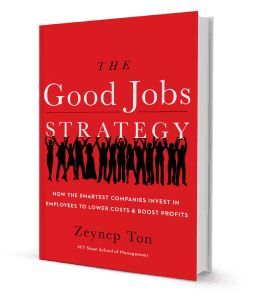
Labor Day is Monday, so maybe it's appropriate that my guest for episode #228 of the podcast is Zeynep Ton, an Adjunct Associate Professor of Operations Management at the MIT Sloan School of Management. You may have recently seen her being interviewed by Fareed Zakaria on CNN. Read her full bio here.
She is author of the 2014 book The Good Jobs Strategy: How the Smartest Companies Invest in Employees to Lower Costs and Boost Profits.

I saw Ton give a lecture at an MIT alumni event back in June and immediately bought and read the book (read my blog post about the book and parallels to Lean and healthcare). I highly recommend it and I wish more hospitals and health systems would pursue this “good jobs strategy” instead of being so focused on cutting labor costs. As Ton explains in the book and our discussion, this strategy is not about being kind or nice — it's just good business that drives better long-term results for all.
Streaming Player (Run Time 32:02)


In the podcast, we talk about:
- How she transitioned from industrial engineering and supply chain management to studying retail companies.
- In the vicious cycle of the “bad jobs strategy, ” why is this considered conventional wisdom that the way to maximize profits in a low-margin industry is to offer minimal pay, training, and hours?
- What are the components (and system) of “the good jobs strategy?”
- What connections do you draw between the good jobs strategy and Toyota or Lean?
- Do the companies or founders that have a good jobs strategy sort of naturally embrace it?
- Of the “good jobs” components, is it most difficult to help people see that 100% utilization is often very harmful and that “slack” is necessary?
- Is it easier for privately held companies to pursue the good jobs strategy having less quarterly financial pressure?
- Any thoughts on why society focuses so much on wages, while seemingly ignoring other aspects of workplace conditions that need to be improved?
For a link to this episode, refer people to www.leanblog.org/228.
For earlier episodes of my podcast, visit the main Podcast page, which includes information on how to subscribe via RSS, through Android apps, or via Apple Podcasts. You can also subscribe and listen via Stitcher.
Video of Zeynep Ton
TedX Cambridge:
Aspen Institute:
What do you think? Please scroll down (or click) to post a comment. Or please share the post with your thoughts on LinkedIn – and follow me or connect with me there.
Did you like this post? Make sure you don't miss a post or podcast — Subscribe to get notified about posts via email daily or weekly.
Check out my latest book, The Mistakes That Make Us: Cultivating a Culture of Learning and Innovation:










[…] here and there. I wrote about how MIT Professor Zeynep Ton emphasized how The Good Jobs Strategy (listen to a podcast with her) is a SYSTEM that must be adopted […]
[…] You can also listen to my recent podcast with Professor Ton. […]
[…] Listen to my podcast with the author, Professor Zeynep Ton from MIT. […]
Here is another podcast with Prof. Ton via MIT Sloan.
At about 18:00 in, she talks about apply The Good Jobs Strategy within a call center at Quest Diagnostics, a big laboratory testing company – a departure from retail. They had great results and intend on spreading this to other parts of the company. Quest has supposedly used Lean for a long time, so I hope that’s all a helpful combination.
What they did:
Increased pay
Changed job design to be more empowered
Standardized processes and cross trained
Their results:
Turnover was cut in half
Customer Satisfaction and cost decreased
Here is information about the new Good Jobs Institute, founded by Prof. Ton:
http://goodjobsinstitute.org/
Jamie Bonini, of Toyota, is on their board of advisors.
[…] Toyota Production System. A more recent case has been put forward in Professor Zeynep Ton’s, “The Good Jobs Strategy”. Identifying the similarities between Toyota and ‘good jobs retailers’ such as Costco, […]